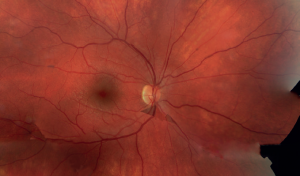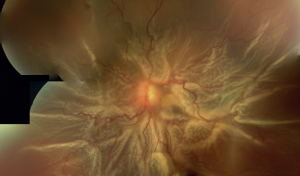
If your vision is spoiled by black ‘floaters’ – lines, spots and shadows – don’t delay getting a specialist check-up.
What are floaters?
Floaters are tiny pieces of debris that float in the vitreous gel of the eye. They may be experienced as black dots, cobwebs or floating black lines in the vision.
They are a common symptom of conditions that affect the vitreous gel and retina of the eye. The retina is a bit like the film at the back of an old-fashioned camera, capturing images from the outside world and sending them to the brain. The vitreous gel sits just in front of the retina. Together, they occupy more than 60% of the volume of the eyeball.
The risk of developing floaters increases with age.
What causes floaters?
Floaters are most commonly caused by ageing of the vitreous gel. As the vitreous gel ages, it becomes more liquefied with clumps of condensed gel that appear as floaters in the vision. Most adults can spot floaters in their vision by looking up at a clear blue sky, although this is not usually bothersome. Occasionally, floaters can be more noticeable and troublesome, interfering with your every day tasks such as reading and watching a computer or TV screen, reducing your daily quality of life.
In people with diabetes, floaters may be due to bleeding from the retina into the vitreous gel due to advancing retinal disease.
Can floaters cause blindness?
Floaters tend to be harmless, but if there is a sudden change or increase in the number of floaters, it is important to have your eyes checked by an optician or ophthalmologist (eye surgeon) because it could indicate a retinal tear or retinal detachment, which can rapidly lead to blindness if left untreated. This is because at birth, the vitreous gel is attached to the retina. Ageing of the vitreous gel causes it to separate from the retina in the majority of people by the age of 70 and, when that happens, occasionally a retinal tear or retinal detachment could develop suddenly.

Normal retina

Advanced detachment of the retina
Other central vision problems
As well as causing floaters, ageing of the vitreous gel can also lead to problems with the central retina itself (also known as the macula), such as macular hole, epiretinal membrane and vitreomacular traction, which can cause central vision problems. Symptoms include distortion and blurring of vision.
Is there treatment?
Floaters can be cured by vitrectomy surgery. Treatment for central vision problems includes vitrectomy and highly delicate retinal surgery. In my clinic, I work closely with patients to ascertain the best treatment option for them.
This article is for information only and should not be used for the diagnosis or treatment of medical conditions. myHealthSpecialist makes no representations as to the accuracy or completeness of any of the information in this article, or found by following any link from this article. Please consult a doctor or other healthcare professional for medical advice.

Mr Chien Wong, Consultant Ophthalmologist and Vitreoretinal Surgeon